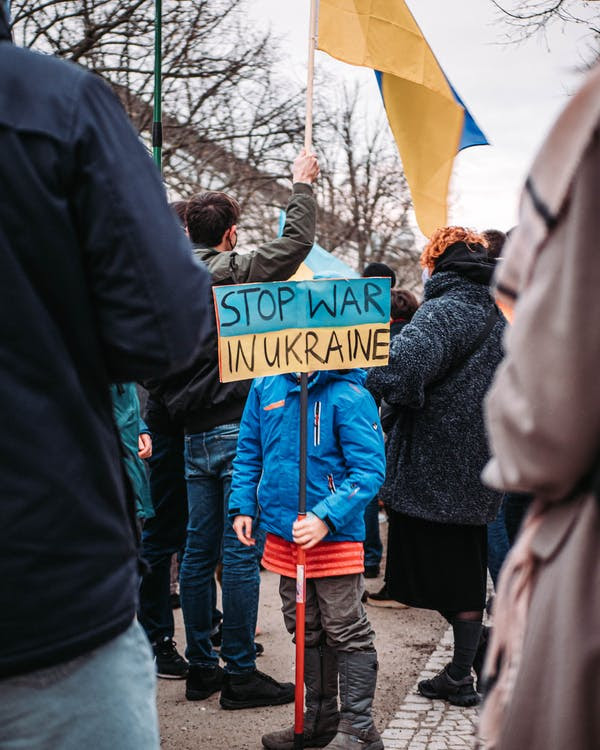Sweeping sanctions are placed on Russia amid ongoing Ukraine Invasion
Photo courtesy of Pexels/Matti.
Child protesting the war in Uraine, Berlin, Feb. 24. 2022.
Since the start of Russia’s recent invasion of Ukraine, the majority of countries around the world have come together to condemn Russian Pres. Vladimir Putin and his administration for choosing to start a war. The nations have imposed an unprecedented array of measures in an attempt to halt Russia’s attack, including harsh economic sanctions. The United States has followed this path, implementing their own measures as well.
On Feb. 24, the White House released a fact sheet entitled “Joined by Allies and Partners, the United States Imposes Devastating Costs on Russia,” which includes statements on Russia’s recent attacks and of the measures that are being taken against Russia. In the statement, the White House writes, “Putin’s threatening actions and now his unprovoked aggression toward Ukraine are being met with an unprecedented level of multilateral cooperation… As a result of Putin’s war of choice, Russia will face immediate and intense pressure on its economy, and massive costs from its isolation from the global financial system, global trade, and cutting-edge technology.”
The U.S. in particular has imposed numerous restrictions in the finance and economic sectors of the Russian economy. The U.S., in conjunction with the EU, UK and Canada, has agreed to cut several Russian banks from the Society for Worldwide Interbank Financial Communication’s international payment system. This widely-used payment system allows fast money transfers across a variety of different financial institutions.
This move will help block Russia’s imports and exports while also denying the banks an ability to operate globally. These nations have also agreed to prevent the Russian Central Bank from accessing its international reserves to mitigate the effects of sanctions.
The U.S. has also put restrictions on Russia’s top 10 financial institutions, which represent around 80% of the nation’s banking sector. More specifically, Sberbank, the biggest Russian financial institution that accounts for more than 30% of Russian banking, has been cut off from conducting transactions within the US system.
Other economic sanctions that the U.S. has placed on Russia have included restrictions on technological imports, the freezing of trillions in Russian assets and the cut-off of several large companies from Western financial markets.
For individuals and their families, the U.S., as well as the EU and UK, have frozen the foreign assets Putin, Foreign Minister Sergei Lavrov, Defense Minister Sergei Shoigu, FSB Security Head Alexander Bortnikov, Armed Forces Chief Valery Gerasimov along with the members who are a part of the Kremlin’s security council. While the U.S. has punished select members of Russia’s parliament, the Duma, the EU has imposed sanctions on all 351 members. The UK, Japan, Australia and New Zealand have all decided to punish specific members.
Olena Lennon, adjunct professor of political science at the University of New Haven said that “sanctions against Russia aim to not only deplete Russia’s war chest and undermine its ability to profit from the global financial system, but also to turn Russian oligarchs against the Kremlin.”
“Authoritarian regimes are rarely fractured by external actors or people’s protests; rather, they are usually overturned by political and military elites from within,” she said.
Beyond sanctions targeting the Russian financial sector, the U.S. has implemented measures in other sectors, such as restricting exports of chips and computers, as well as targeting Russia’s defense, aerospace and maritime sectors. This last measure comes as an attempt to limit the Russian defense industry’s access to Western material. The restriction placed on U.S. exports of high-end technologies to Russia comes as part of this measure.
As of Feb. 28, one of the most recent measures that the U.S. has taken against Russia was to expel 12 Russian U.N. diplomats who were accused of spying. This change was noted at the opening of the Feb 28. Security Council meeting.
Across the globe, many private companies, of their own free will, are boycotting Russian made products and exiting or cutting their investments in Russia.
“One of the most remarkable displays of condemnation of Russia’s egregious violence in Ukraine was a withdrawal of individual companies from Russian markets on their own accord, without waiting for a government mandate,” Lennon said. “Among companies that discontinued or significantly limited their business ties with Russia are energy giants such as BP Plc, Shell Plc, Exxon Mobil and others.”
Lennon added, “Sanctions will no doubt devastate the Russian economy and cripple its ability to modernize. However, the brunt of the financial burden will be carried by average Russian people, not the elites, and it is still unclear whether the current sanctions––harsh though they might be––will deter Putin from further aggression in Ukraine in the short-term. In the long-term, however, sanctions are certainly likely to throw a wrench into the Kremlin’s killing machine.”
The U.S. has also levied sanctions on 24 Belarusian individuals and entities for aiding Russia in invading Ukraine. These sanctions target Belarus’ military and financial power through sanctioning two significant state-owned banks, nine defense firms and seven regime connected officials and elites.
Many of the aforementioned sanctions have been created by nations in tandem with one another to present a united front against Russia. Discussions between countries, especially within the United Nations, continue to occur in order to increase joint restrictive measures.
Throughout the past few weeks, the United Nations Security Council has met four times to discuss the invasion.
The General Assembly: Eleventh Emergency Special Session (Ukraine) – 1st Plenary meeting also convened on Feb. 28.








